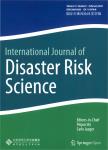Risk Perception and Knowledge in Fire Risk Reduction in a Dong Minority Rural Village in China: A Health-EDRM Education Intervention Study
Risk Perception and Knowledge in Fire Risk Reduction in a Dong Minority Rural Village in China: A Health-EDRM Education Intervention Study作者机构:Collaborating Centre for Oxford University and CUHK for Disaster and Medical Humanitarian Response (CCOUC) The Chinese University of Hong Kong Nuffield Department of Medicine University of Oxford The Jockey Club School of Public Health and Primary CareThe Chinese University of Hong Kong Franois-Xavier Bagnoud Center for Health and Human Rights Harvard University Integrated Research on Disaster Risk (IRDR) International Centre of Excellence–CCOUC (ICoE-CCOUC)
出 版 物:《International Journal of Disaster Risk Science》 (国际灾害风险科学学报(英文版))
年 卷 期:2018年第9卷第3期
页 面:306-318页
核心收录:
学科分类:08[工学] 0837[工学-安全科学与工程]
基 金:supported by the Jockey Club School of Public Health and Primary Care (SPHPC) Medical Humanitarian Response and Disaster Development Fund Wu Zhi Qiao Charitable Foundation Chow Tai Fook Charity Foundation The Hong Kong Jockey Club Charities Trust
主 题:Dong village Fire risk education Fire risk perception Fire risk reduction Health education Rural China Health-EDRM
摘 要:Fire is one of the major disasters in rural communities but evidence of the effectiveness of education interventions against fire risks is limited. This was a 2-year study assessed the effectiveness of face-to-face Health Emergency and Disaster Risk Management(HealthEDRM) education interventions for raising fire risk reduction knowledge in a fire-prone rural ethnic minority community. The study was conducted in various pre-set time points of an intervention-based project in a Dongbased community in Nanjiang Village, Guizhou Province in 2015 and 2016 to increase knowledge among the villagers about how to reduce general-and electrical-fire risks. Pre-and post-intervention questionnaires were used to evaluate the effectiveness of increasing fire risk-related knowledge through these interventions, immediately after the 2015 and 2016 interventions, and 17 months after the 2015 intervention. The knowledge of using fire blanket,recalling the correct emergency telephone number,unplugging unused electrical appliances, and not using water to extinguish electrical fires had immediately improved after the interventions. Subjects demonstrated a better understanding that fire blankets can fight a blaze if used appropriately, and that knowledge was sustained for 17 months. The interventions were effective in improving fire prevention and response knowledge. Targeted interventions should be organized according to communities culture, the evolution of economic prosperity and lifestyle practices.



